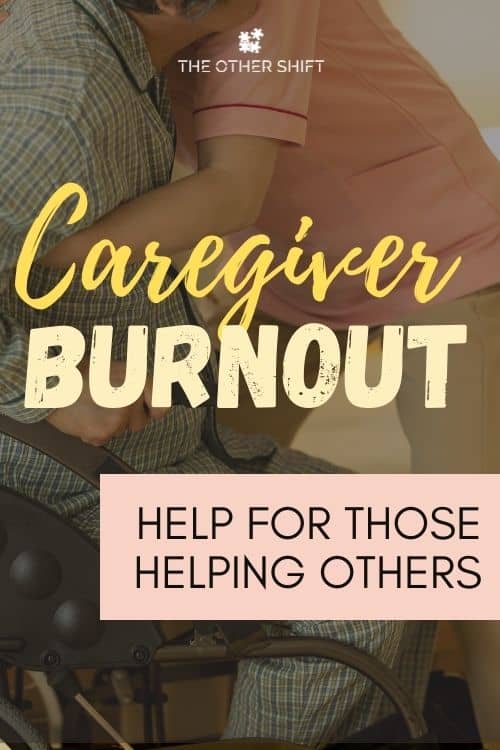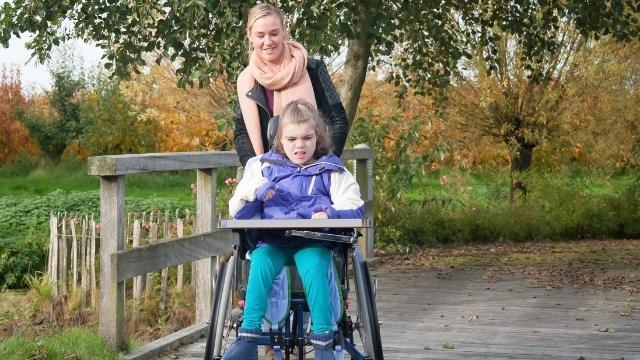Disclosure: This page may contain affiliate links, meaning we receive a commission if you decide to make a purchase through our links, but this is at no additional cost to you. Please read our disclosure and privacy statement for more info.
Caregiver burnout negatively impacts the life of the individual causing a decline in their performance and ability to do their job. Left unchecked, caregiver burnout will begin to disrupt other aspects of the caregiver’s life. It will also begin to interfere with the lives of everyone around the caregiver.
Caregivers, typically those caring for the aged or disabled, are highly susceptible to burnout. The physical demands coupled with the mental repetitiveness of the role can lead to fatigue, stress, weight gain and hopelessness. Knowing your limitations, setting boundaries and communicating with others will help.
Who Are Caregivers?
Found in a multitude of environments, a caregiver assists a person who requires help with meeting their daily needs. Professional caregivers, like doctors and nurses, are responsible for the medical care of those they serve. Other types of caregivers provide personal care services to individuals in their homes or other residential facilities.
Caregivers typically offer support to people who are elderly or disabled. They may be a paid professional hired from an agency that works a set number of hours. Oftentimes, the role of caregiver falls on a family member or close friend.
Being a caregiver can have a wide range of responsibilities including:
- Assisting with daily personal hygiene tasks such as bathing, shaving, and brushing teeth or hair
- Helping them get in and out of bed or other mobility assistance that is needed throughout the day
- Cooking healthy meals and maintaining a clean environment to ensure safe living conditions
- Grocery shopping and running errands to keep household supplies well stocked and readily available
- Taking them to doctor appointments or other medical facilities for treatments and therapies to receive routine checkups and health care
- Registered Nursing
In professional settings such as nursing homes and assisted living facilities, caregivers are responsible for the daily needs of the residents. Like in-home caregivers, they help with tasks related to hygiene and mobility. They are also tasked with monitoring the health of the residents by checking their vital signs and observing responses to treatments.

Hospice Caregivers
Hospice caregivers are people who work to meet the needs of those who are dying. These caregivers have the job of keeping patients as comfortable as possible during their final days. Their specific roles will depend on the condition of the person they are caring for and can be as minimal as companionship or clinical in nature such as performing pain medication injections.
Being a caregiver isn’t restricted to caring for the disabled and the elderly.
Childcare workers are an often overlooked group of people who can suffer the same caregiver burnout. Parents who stay at home with their children, as well as people who work in school settings, can fall victim to caregiver burnout.

Why is the Role of a Caregiver So Critical?
Caregivers play a critical role in the health and safety of the people they watch over. As caregivers to the elderly, they provide a vital need for human connection to an often isolated population. When caring for children, they offer a nurturing kindness to a vulnerable and trusting young person.
Cooking meals becomes burdensome to older individuals leaving them with fewer options for eating. Receiving help from a caregiver can mean the difference between quality meals and malnourishment. This can be especially true for elderly people living alone on a fixed income who were accustomed to having their meals prepared for them by a spouse.
Assistance with the practice of daily hygiene rituals has an impact on both the mental and physical well-being of the individual.
A refreshing shower does more than just wash away dirt and grime. Being clean rejuvenates the body and provides a greater sense of feeling invigorated and energized.
Caregivers are often the communication link between the person they care for and the doctors who treat them. Keeping track of medical appointments, assisting with dosing of medications, and even taking vital signs can be a part of a caregiver’s daily routine. In addition, caregivers can help keep family members informed of any changes to the person’s health or new diagnosis that need to be addressed.
Beyond the tasks of cooking, cleaning, and medical interventions, caregivers play the important role of companionship. Feelings of loneliness are detrimental to a person’s ability to function and can even impact one’s physical health. A quality caregiver knows the importance of taking time to be there for someone who just needs an ear to listen.

What Causes Caregiver Burnout?
Burnout occurs frequently among caregivers because they spend most of their time meeting the needs of others. As a result, they are often forced to neglect their own needs for any number of reasons. Be it not having enough time in the day or not having the energy to do what needs to be done, caregivers have their limits.
A caregiver’s job may include physically demanding tasks such as lifting a heavy person or being on their feet for extended periods of time. Having a job that requires plenty of strength has the potential to cause exhaustion and fatigue. If a caregiver doesn’t get the rest they need to regain their strength each day, the potential for physical burnout becomes eminent.
Maintaining the cleanliness of multiple households in addition to one’s own home can lead to physical exhaustion. The actions of sweeping, mopping and other daily cleaning tasks can lead to feeling tired. Factor in the mundaneness of the chores and the repetition of the job and you begin to understand where caregiver burnout can begin.
Caregiver burnout can also occur in the form of mental exhaustion. Spending time making decisions for others can be taxing on the mind. Plus, always having to remember everything for everyone else will lead to forgetting about your own to-do list and responsibilities at home.
Mental exhaustion often comes from working with elderly patients who suffer from issues of cognitive decline like dementia and Alzheimer’s disease. Caregivers in this position are continually faced with the unexpected. Being able to think quickly and react even faster can both be a drain on your mental health.
Another thing that leads to caregiver burnout comes in the form of emotional exhaustion. This form of burnout commonly occurs with caregivers who are taking care of family members. It can also be seen in those caregivers who have become emotionally invested in the people under their care.
Caregivers taking care of a family member are at risk of burnout when they are unable to separate their role as the caregiver from their role as spouse, sibling, or child of the patient. They may also become overwhelmed by the lack of money or resources needed for proper care. Sometimes, a caregiver’s burnout is the result of unreasonable demands placed upon them as the sole caregiver of a loved one.
Other factors known to lead to caregiver burnout include having expectations that are inconsistent with the situation. Sometimes a caregiver believes the work they do will have a positive impact on the health of the person under their care. In some situations, this is an unrealistic outcome, especially when a progressive disease like Parkinson’s will never improve.

Identifying Caregiver Burnout
Signs of caregiver burnout look very similar to the symptoms of stress and depression. Significant hair loss and sudden changes in habits can be a clue to properly diagnosing burnout. A caregiver who’s normally on time and never absent may begin showing up late to work or calling in sick more frequently.
Other changes in behavior can include eating habits such as overeating or skipping meals altogether. These shifts in behavior can lead to noticeable changes in the caregiver’s weight and levels of energy. Sleeping more or the inability to sleep well are also signs that a caregiver is suffering from burnout.
Caregivers with burnout will begin to lose interest in the activities they previously enjoyed. At times, a caregiver will experience feelings of irritability, sadness, and even hopelessness. As a result, they may begin to avoid spending time with family and friends.
Without intervention, symptoms of a caregiver suffering from burnout will continue to worsen over time. As they slip deeper into the negative feelings brought on by burnout, a caregiver may become physically and mentally drained to the point of indifference, unable to sleep. This could lead to thoughts of self-harm or inflicting abuse on the person under their care.
If sleeping is a problem for you, we recommend the aids below. Manta eye mask and blue light-blocking glasses. They have helped us significantly.


Helping a Caregiver Recover from Burnout
Caregivers who suffer from burnout often experience feelings of guilt, especially when they are taking care of a loved one. They falsely believe that these feelings are to be expected as they sacrifice their own happiness for others. Recognizing the signs of caregiver burnout is the first step to helping them recover.
Offering support can be as simple as providing an open ear for them to talk about how they are feeling. A caregiver in the depths of burnout will feel isolated and alone making it difficult for them to ask others for help. Talking about the situation in an empathic and loving manner can be a big step towards recovery.
Since burnout symptoms are very similar to those of depression, many of the same treatment methods can be used. And like depression, caregivers with burnout will need the help of others to get back to normal. That’s why having a solid support system in place is essential to recovery.
Having someone to talk to will provide insight into what can be done to relieve the caregiver from feeling broken. Taking time to address the ways being a caregiver has negatively impacted their life will help to find viable solutions. Many times, a caregiver has taken on too much at once and this overwhelming amount of responsibility becomes a burden.
Caregivers need to be able to step away from the role of taking care of others in order to have time to take care of themselves. This may mean finding others who can take on some of the caregiver’s jobs to relieve the stresses of doing it all. In some instances, the caregiver of a family member, for example, may need to hire help.
Adding a maid service or having someone else cook meals are two ways to relieve a caregiver of being the sole provider. Sharing the workload of caregiving can make a huge difference in the quality of everyone’s life involved. Plus, it shows the caregiver that they don’t have to be alone as they take care of others.
Most importantly, a caregiver needs to take time to care for their own needs. Making sure to get adequate sleep, eating healthy, and staying active are great ways to self-care. In some situations, it may be necessary for a caregiver to take an extended break in order to become fully refreshed and ready to jump back into the role of caregiver.
For those caregivers working the night shift, this video will help.
Ways to Prevent Caregiver Burnout
Caregivers can take a number of steps to help prevent burnout. The first step to preventing burnout is knowing your limitations as a caregiver. Setting realistic expectations with regard to your role and your abilities will help you establish boundaries.
It may be necessary to make a list outlining what role the caregiver plays and what jobs are not their responsibility. Without an established job description in place, a caregiver is at risk of being overworked from doing more than expected. In the case of caring for a family member, this happens frequently due to a feeling of obligation to the loved one.
By creating a caregiver checklist, those involved can see what needs to be done and who needs to do it. This will help to highlight any areas of care that have been neglected. It will put in place a standard of care that ensures all needs are being met without anyone being compelled to do more than is needed from them.
We wrote another post titled, Night Shift Rut: Break the Cycle and Get Your Life Back which we encourage you to circle back as it has some realistic strategies you can apply right now.
Time management
As a caregiver, time management becomes increasingly important to ensure you meet those expectations. It also creates a framework for you and others to see your time as important outside of being a caregiver. Taking time for yourself each day will provide the opportunity to break away from caregiver mode and meet your own needs.
Communicating with others
Another tool to prevent burnout is talking to other caregivers about the stresses and worries associated with being a caregiver. This can provide a sense of relief to learn others are experiencing the same way. Having others who understand how you feel reduces the feeling of being alone in the fight.

A caregiver is truly a vital role for the growing number of elderly and disabled people. Sadly, it is often a thankless job involving long hours and little compensation. Taking on the role of caring for others requires both physical and mental strength as well as knowing how to say I need help when things get to be too much.
Keep reading – Wanting to Quit Shift Work? 13 Signs Change is Required

Disclosure: This page may contain affiliate links, meaning we receive a commission if you decide to make a purchase through our links, but this is at no additional cost to you. Please read our disclosure and privacy statement for more info.
Recent Posts
While the stresses and hardships of work affect all, signs point to significant pressures faced by those working through the night leading to early critical health problems. But is it all doom...
Switching your days and nights around might be easy in your twenties, simply pull an all-nighter and crash. Problem solved. If you’ve been on midnights for ten or more years though, the adjustment...

